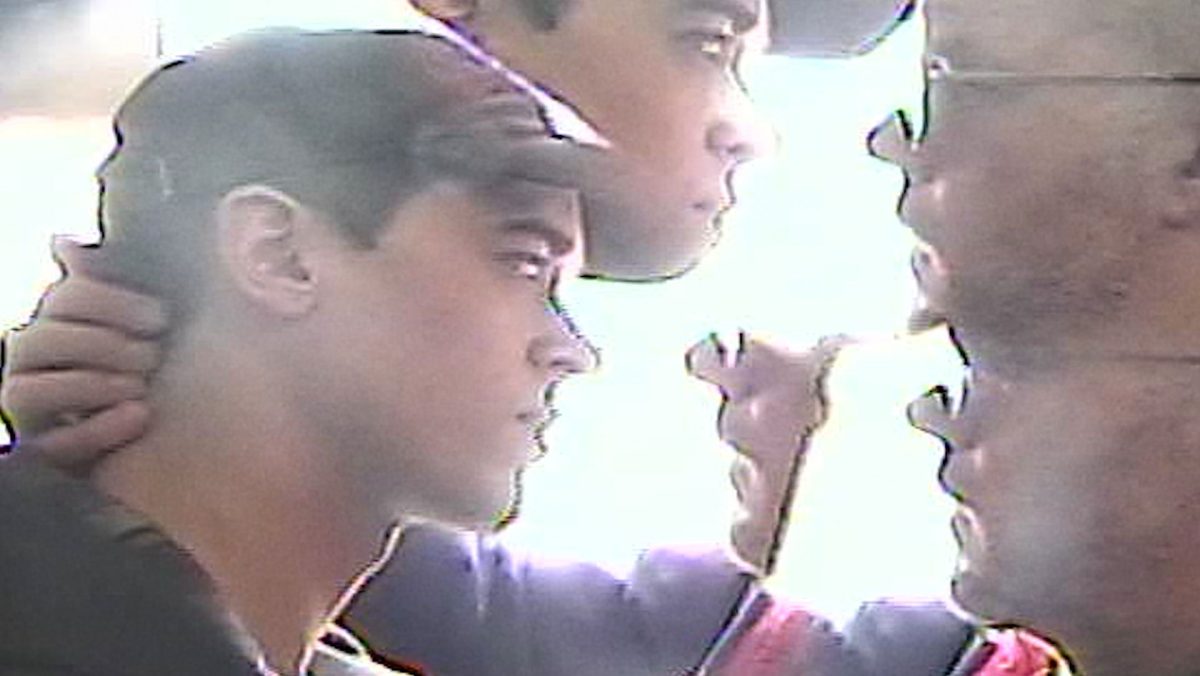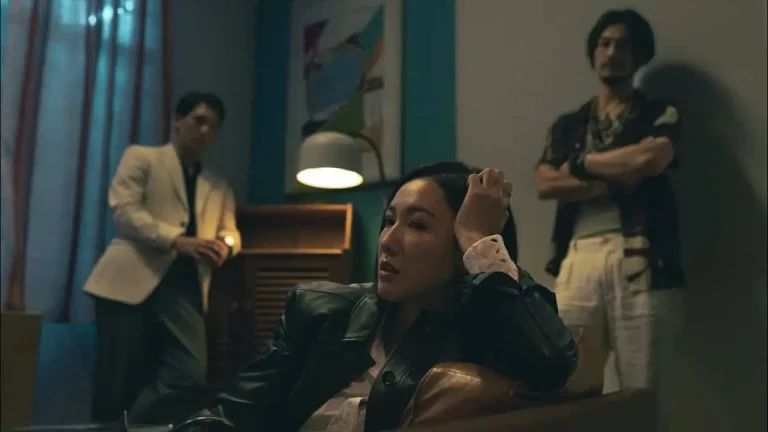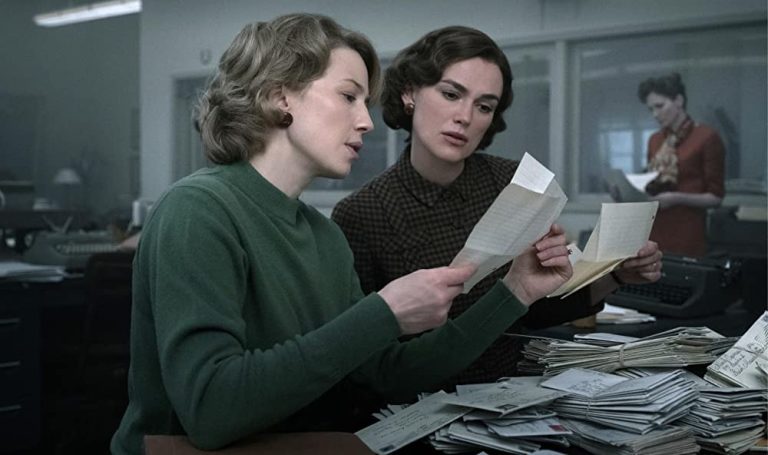What happens to men whose lives are bound by a secret? In Carmen Emmi’s affecting yet over-stylized directorial debut, we are told that these secrets can’t be contained, that they will at some point implode in an explosion of catharsis, pain, and relief. Set in New York, 1997, “Plainclothes” captures a time in which oppressive legal and cultural systems forced homosexuality into the fringes of society. However, as Emmi reminds us in the film, the stories of suppressed sexuality are scratched into the concrete of New York’s streets.
Hiding beneath the surface of the city are stories of secret desire – whispers in the shadows of parked cars, shame stuck to the seats of popcorn-crusted theatre seats, and love banished to the toilets of shopping malls – smothered by a persistent indignity which bubbles beneath the sidewalks, surveilled and contained by perverse government policies.
“Plainclothes” follows one of these many stories. Lucas (Thomas Blyth), a closeted gay man, works undercover in a police operation that entraps and prosecutes gay men. Naturally, working undercover is the perfect place for Lucas to keep his secret hidden. His protective layers begin to unravel, however, when he meets Andrew (Russel Tovey) during an undercover operation and finds himself hopelessly drawn to him. The realisation that this meeting is just another transitory encounter for Andrew only deepens Lucas’s turmoil, causing his personal and professional life to collapse as his feelings intensify.
Intelligently packaged, “Plainclothes” is a poignant LGBTQ+ drama wrapped in the intriguing malaise of a 90s cop thriller, providing a unique framework to explore how Lucas and Andrew wrap themselves in society’s costumes (one a cop, the other a priest) and the way in which these material identities help the men to hide.
Check Out: The 15 Best LGBTQIA+ Movies of 2022
Anchored by two powerful lead performances, “Plainclothes” evocatively documents the experience of desire forced into the shadows. Lucas and Andrew struggle to show even a flicker of affection in a darkened movie theatre, their intimacy framed against the backdrop of the bright cinema screen. The dazzling, otherworldly face of the big screen is juxtaposed with the film’s intimate visual style, shot by cinematographer Ethan Palmer, intensified by the boxy 4:3 ratio, which pushes us uncomfortably close to the characters’ lives.

Claustrophobia lifts in moments of unleashed desire, where, during a hook-up in a greenhouse away from the city’s hardened streets, the aspect ratio, rather heavy-handedly, expands to a wider alternative. The screen itself embraces the magnitude of the moment. The cop-thriller exterior is an intelligent motif that provides an entry point to examine and explore the daily disguises of the gay community. Visually, the greenhouse walls echo the two-way mirrors used by the cops to observe their victims. Surveillance, the film’s central motif, lingers; their love exists within glass walls, never truly unseen.
Accompanying the central narrative are camcorder-style flashbacks, which capture Lucas’s trauma and memories. The hazy handheld footage speaks in part to the surveillance state but also to his own relentless self-destruction and inability to escape himself. “Plainclothes” is less about the watchful eyes that suppress homosexual activity than it is about the eyes of the suppressed themselves.
And yet, despite surveillance sitting so centrally to the film, these ideas never feel fully explored or realised. For all its unique visual style and nonlinear storytelling, we’re left with a familiar and bleak LGBTQ+ drama that treads well-worn ground. The approach is novel, but the result feels slightly overworked – an age-old story (which is ironic, given the heightened contrivance of its melodramatic ending) told with new colour and style, but one that never quite escapes its own sense of pastiche.
The film’s heavy-handed style and jarring musical cues undermine its strong performances, reducing its impact to something closer to a stylised music video. It’s as though Carmen Emmi doesn’t quite trust the story and relies on cheap tricks to craft these feelings and ideas, when in fact the over-editing mutes and suffocates the narrative in a blanket of over-stylized saturation and on-the-nose visual metaphor.
Ironically, for a film about a man’s failure to escape both societal and self-imposed cages, “Plainclothes” itself feels restrained, unable to free itself into something different or exciting. The film becomes a sort of two-way mirror, an unsolicited insight into two men’s lives that leaves the viewer distant and cold. We’re never truly able to break through and understand their inner workings. The limited screenplay and heavy-handed editing push us away rather than drawing us in, restrained by directorial flourishes that alienate rather than invite.
“Plainclothes” may not fully transcend its own artifice, but beneath the gloss and grit lies a filmmaker with a clear, empathetic eye for the quiet devastation of secrecy. In the end, it is a film caught between its own reflections – compelling to look at, but never quite able to see itself clearly.


![The Bad Man [2021]: ‘Locarno’ Review – How the Brutality of War Changes a Man](https://79468c92.delivery.rocketcdn.me/wp-content/uploads/2021/08/The-Bad-Man-768x405.jpeg)


![First Love [2019] Cannes Review- A Hilarious Action Thriller from Takashi Miike](https://79468c92.delivery.rocketcdn.me/wp-content/uploads/2019/05/first-love-teaser-11-cropped-e1556117153197-768x432.jpg)
![Sagara Sangamam [1983] Review – Of art, life and death](https://79468c92.delivery.rocketcdn.me/wp-content/uploads/2018/05/download.png)
![Quiz Show [1994] Review – A Thought-provoking Look at the Shallowness and Chicanery of Show Business](https://79468c92.delivery.rocketcdn.me/wp-content/uploads/2021/05/Quiz-Show-1994-768x520.jpg)